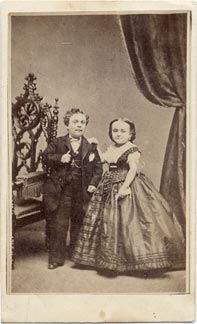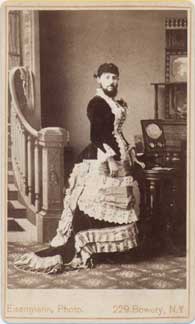|
In the less enlightened days of the 19th and early 20th centuries
those who were "different" from most people; smaller,
larger, with unusual physical characteristics were called "freaks".
They appeared in numerous "dime museums" like P.T.
Barnum's American Museum, circuses, and side shows. It is easy
from our 21st
century perspective to look at society's fascination with these
people as exploitative and demeaning. While the recent reputation
of the carnival side show is decidedly tawdry and the exhibiting
of people with physical abnormalities is even illegal
in some
states, reading about the lives of the 19th century "freaks"
shows some surprising differences. Many were performers who were
known for their talent and intelligence. Some of them were paid
extremely well for the times, traveled extensively, met with Presidents
and the crowned heads of Europe, and saved enough money during
their
careers to invest and live out their retirement in comfort. At
the time of their marriage Tom Thumb and Lavinia were paid $3,000
a week plus $300 each day from the sale of their autographed carte-de-vistes,
Many of them married "regular" people
and had families. In a time when there would have been little chance
for
a physically
challenged person to find work they were able to support their
families and make a life for themselves. It has been suggested
that these
people were more valued then than those like them are today.
Their photographs were produced in quantity and sold to the public
as collectible curiosities. The more successful shared in the
profits
of the sales. When we first began collecting in the early 1970s
these images were not very expensive. Penciled prices of $1.50,
$2, and
$5 are still on the back of some. While the ordinary portrait photographs
from this period still sell for only a few dollars, "Special"
pictures like these are now quite expensive. Yes, we do find these
photographs are often disturbing but they seem too important to
the understanding of the place of photography in society to ignore.
|

Among the best known of Barnum's performers were
Charles Sherwood Stratton, AKA General Tom Thumb and his wife
Lavinia Warren. We have a number of Brady photographs of their
1863 wedding party in carte-de-visit and stereo format. Also
well
know are the photographs with the pretend Thumb's baby, a real
baby but not really the Thumb's baby.
*
12/2005 To share more of our photographs of this very special
man and his friends and family we have
added a page Tom Thumb and His Circle.
|
|
On the far left is Admiral Dot, a Barnum midget from the same
era as the Thumbs. Like General Tom Thumb the military title was
obviously ironic. Born Leopold Kahn, he met Barnum in 1868 and
had a career of 20 years.
Nellie Keeler was another of Barnum's little people. In the carte-de-visit
on the left Bogardus uses massive furniture to emphasis her tiny
size. The information on the card front tells us that she is 11
years old, 28 inches high, and weighs 12 pounds.
|
|
Issac W. Spraque, billed as the Living Skeleton, is shown here
at age 24. He is listed on the card front as being 5 feet 4 inches
and weighing only 48 pounds. It was not uncommon for height, weight,
age or other stated statistics to be given as more or less than
reality to emphasize the special characteristic being offered.
Spraque and other Living Skeletons almost certainly suffered from
some wasting disease and may have appeared on stage because they
were not physically able to work.
|
In this carte-de-visite by Charles D. Fredricks & Co. New York,
Madame Sherwood - Giant Lady is listed as weighing 675 pounds.
The stated weight may well have been exaggerated since this was
a common ploy to improve the marketability of the performer.
In the light of today's sensibility we find it hard
to accept that the "fat lady" was an enduring staple
of any exhibition of unusual people in this period. |
Another staple of the dime museum, circus, and side
show was the giant. Unusually tall people have been looked at with
fascination
since antiquity.
The carte-de-visite card below shows a giant in uniform
with a "normal" man looking up at him. Without this man
for scale
we would
not know how big he is. In the same way furniture or larger
people gave scale to the photographs of midgets.
Other copies of this image are identified as Monsieur E.
Bihin, a Belgian giant with great strength. |
|
|
|
|
| Information about these special people can not always
be taken at face value. Waino and Plutano were billed as the "Wild
Men from Borneo" but were really dwarf brothers from Connecticut. |
Eli Bowen, the Legless Wonder, who was born without
legs developed very strong arms and performed acrobatic feats on
stage.
He married and fathered a number of children before retiring
. |
The photograph below is of the albino Lucasie family,
who appeared in Barnum's Museum in New York. Matthew Brady's studio
was across the street from the Museum. This unmarked card is from
one of his images. |
|
|
|
|
|
The carte-de-visite below of Delina Rossa is one of our special
treasures. It shows not only a young bearded lady in an elaborate
dress but on the table is a stereo graphoscope (combination stereo
view and print magnifier). We have a number of these viewers in
our stereo viewer collection and would have bought the card even
if the woman had no beard.
|
The bearded lady, Annie Jones, was described as having the manners
of a society lady. Exhibited by Barnum at a very young age, she
was
kidnapped
by a
Phrenologist. Her family had to sue to get her back. The kidnapper
claimed that she was his child although the likelihood of two little
girls with the same unusual characteristics seems to stretch credibility.
Annie married twice, toured Europe and invested her considerable
earnings in Real Estate. |
Carrie Akers was promoted for both her short stature, 31 inches,
and her weight, 309 pounds. In this cabinet card by Eisenmann of
New York she is shown with a man presenting her with flowers. They
stand in front of a studio backdrop of a rustic log cabin.
Eisenmann's studio produced a large number of photographs of these
special people. |
|

|
|
|
|
|
Return to The Collection of Collections page
Collection of Collections Site Map
Contact us at studio@brightbytes.com
**NOTE** All
items on the Collection
of Collections web site are in our private collection and are
NOT for sale. From time to time duplicate items
from our collection will be offered for sale in the
Do
You Remember This? shop on the GoAntiques cyber mall. Visit the Do
You Remember This? inventory page for photographica
and toaster related collectibles.
Please feel free to write us if you want to chat or
share information about areas we collect but we will NOT give appraisals.
© Bright Bytes Studio - Do not use images without permission
Updated on 12/2005 |